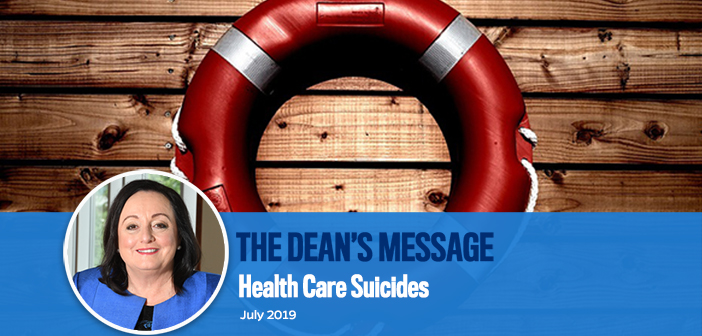Suicides among nurses and health care professionals are happening at distressing rates and more frequently than among their age-matched peers.
As someone who has been in the profession for more than 35 years, I can’t help but find myself searching for an explanation.
Sadly, in many ways, our health care environment has become like a pressure cooker where speed and cost are priority. Nurses and health care professionals face challenging work cultures and long shifts. They carry the weight of emotional encounters with patients and families. And too frequently they witness the deadly burden of social determinants of health that prevent care from being what it should be. This confluence of factors is distressing and undermines what we feel is our responsibility to promote health, provide access to treatment, and safely and confidently voice our opinion.
At the Johns Hopkins School of Nursing, I get to witness students and faculty who spend countless hours researching, talking to patients, and studying to be top of their field—not for their own benefit, but for the improvement of the health of the world. We can’t let that passion and devotion get swept up in the platitude that we do more with less no matter what the outcomes.
So, what should health care professionals do?
- Keep this conversation going. Speak to our management and professional organizations about working conditions, barriers to care, and areas where policy needs to be changed. Their influence can provide us with a platform to be heard.
- Listen to and engage with our colleagues across the health care professions. Understand their specific challenges and work together to develop team-centered solutions to stressful environments and ethical situations.
- Teach the next generation about effective self-care. Thoughtfully consider our moral values and how they should be represented and regarded in our work.
- Make sure we have at least one trusted colleague or mentor. Participate in activities that fulfill our soul outside of work.
- Find methods to build resilience, and invest in programs like Mindful Ethical Practice and Resilience Academy (MEPRA) that will reach both leadership and frontline care providers. MEPRA was developed by Johns Hopkins School of Nursing faculty Cynda Rushton to help nurses stave off burnout through meditation and mindfulness. Her new book Moral Resilience: An Antidote to Moral Distress is a resource that offers practical ideas for reducing burnout and building a sustainable workforce that operates with integrity.
Suicide is an alarming and heartbreaking emergency. We don’t know all the reasons, but we can recognize when there’s a problem. It’s time we move away from evangelism and projects to systemic cultural change. Our profession and our lives depend on it.
Learn more:
- Listen to Dean Davidson’s full podcast on this topic.
- Learn more about what the Johns Hopkins School of Nursing is doing to infuse ethics and moral resilience into education and practice.
